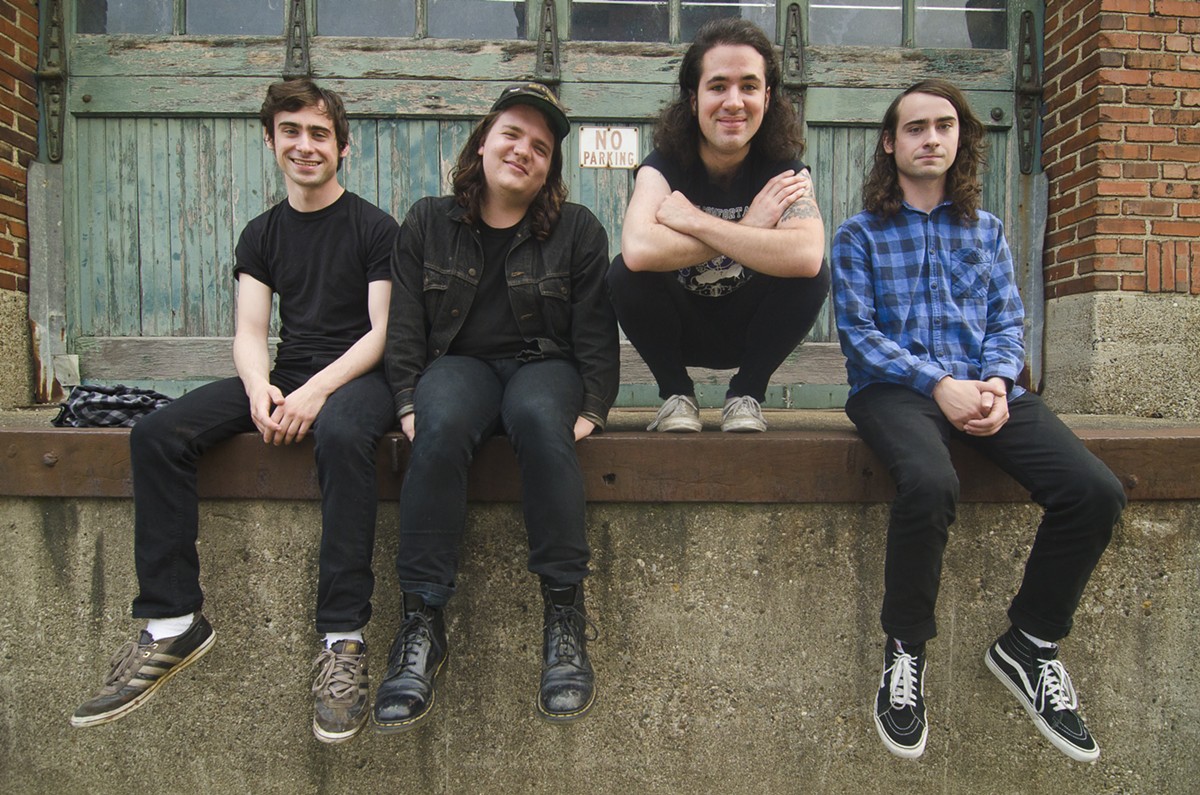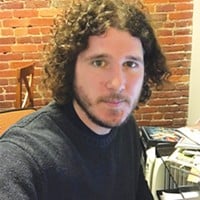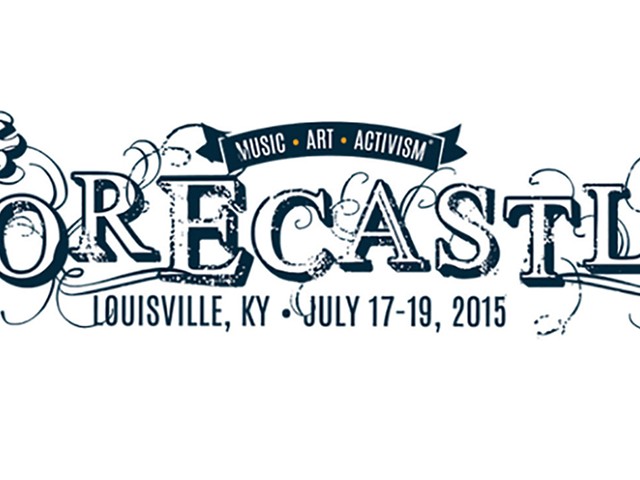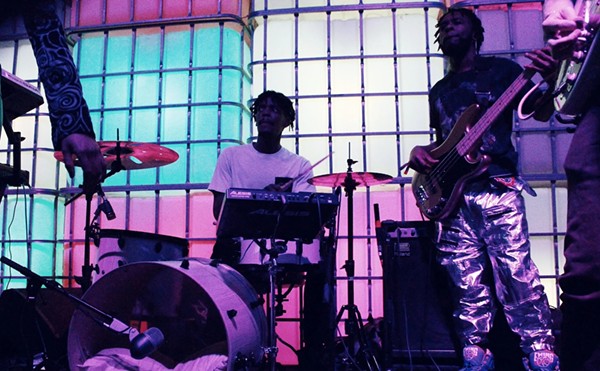“Get up here … I mean, you can sit down if you want, you paid to get in here,” White Reaper’s singer/guitarist Tony Esposito told the crowd at Newport’s Southgate House Revival in early June — the first stop of a month-long tour that would take them to Seattle and back — before blasting into their opening song “Make Me Wanna Die,” a driving, fuzz-infused rocker off of their forthcoming record, “White Reaper Does It Again.” And, with that, the energy in the room changed. People left the tables scattered across the venue’s floor and packed into the stage, as Esposito alternated emphatic vocal entries, ’80s rock-star kicks and quick, confident solos, while Ryan Hater headbanged wildly, repeatedly throwing his shoulder-length hair over the keyboards. Sam Wilkerson stood on amps and pointed his bass toward the ceiling and his twin brother, Nick, aloof and collected, rounded out the rhythm section with supercharged drumming. It was still light out and the band that left the stage 15 minutes prior had people casually watching and chatting, making it feel like a Sunday afternoon happy hour. White Reaper took a hard left turn, taking the vibe into more of a mid-Saturday-night-bender direction.
They were only playing to around 75 people — a stark difference from their shoulder-to-shoulder hometown Louisville shows — which is to be expected, but it seemed like they would’ve played exactly the same way to a sold-out baseball stadium. In a time when being on the road is the backbone of a young band’s existence, bringing that sort of energy every night seems imperative, a way to build a following in other cities. But, for White Reaper, it’s much more simple, as they told me after the show, as we stood around their small tour van, scattering in a few topics relevant to the interview around conversations about the Scream movie franchise and the best places to get hotdogs.
“To me, that’s not even something that should be complimented, because I think that is what you’re supposed to do, is to give it your 110 percent, no matter what, whether there’s three people or what,” Hater says. “And we’ve been guilty of not doing that before and we always feel really bad about it afterward. Who cares if anyone else is having fun? If you’re having fun, other people will start having fun. It’s our job to entertain the people there. They’re not there to entertain us.”
“It doesn’t matter who is there, you just got to do it,” Esposito adds. “That’s how we practice now. When we practice in the basement, we bump into each other. You should practice like that. If I paid $15 and I just saw a bunch of dudes standing still, I’d be angry. I understand that people want to hear live music, but it’s also a show. You need to be entertained.”
Bringing it all back home
The self-titled, six-song debut EP that White Reaper released in 2014 was built with a formula that didn’t veer far from their strengths: straight-forward riffs, sugary hooks, snappy snarls and wild howls swirled in distortion, a simplistic lyrical structure and a rhythm section that held the pedal down without flying off track. They made pop songs that sound like they want to set other pop songs on fire. Not much has changed, but now they do it with a confidence and prowess that has allowed them to expand their range, if only slightly — enough to bypass repetitive and keep cohesiveness under their thumb — without losing their signature blueprint and energy. They’re having their fun at a higher level. And it shows on “White Reaper Does It Again,” the 12-track LP that they are releasing at Headliners on Saturday, July 18, the night before their first time slot at Forecastle.
“White Reaper Does It Again” was produced by Kevin Ratterman and recorded at La La Land Studios. Known for his work with My Morning Jacket, Houndmouth, The Flaming Lips, Murder By Death, Preservation Hall Jazz Band, among many others, Ratterman, according to the members of White Reaper, added a heightened level of professionalism and depth to the record, without contributing any sort of pressure that might be associated with it being their first full-length.
“It really speaks to his talent that we really did barely talk to him,” Esposito says. “He knew what we wanted before we did. And he just nailed it. He would just kind of candidly be like, ‘Maybe you guys should do this.’ And we would be like, ‘Wow, he’s totally right.’”
The album was recorded in 10 days, the longest they’ve ever been in the studio. Even though they ran into initial roadblocks — nerves got the best of them and they played a few songs too quickly instrumentally and the vocals didn’t match up — there was a level of comfort, with not only the relaxed atmosphere of La La Land, but also because they didn’t have to tour out to a studio, something that could have caused a serious time constraint. They also got to sleep in their own beds.
“I just finished reading this book about Ozzy and he said that the further you have to travel to record a record, the worse it sounds,” Sam Wilkerson says.
And since it was recorded in January, it means they’re far enough away from the stress and tribulations of the studio to already be thinking about the next record.
“One hundred percent, the next record is going to be recorded by Kevin Ratterman,” Esposito says, standing by the van outside of the Southgate House Revival back in early June. “Unless he says no. And, if there’s one that comes after that, probably going to be him too. This was the first time we’d ever [had a producer], but it wasn’t hard to work with him. It was like he had been there all along. He just got it. He just knew. He has this incredible ear.”
And, then, like they so often do, one of them charismatically derails the conversation.
Nick Wilkerson: “He also bought a real big pizza on our last day.”
Esposito: “It was the biggest pizza I’d ever seen.”
Nick Wilkerson: “It didn’t fit through the door properly.”
Esposito: “He had to open up his garage door.”
Hater: “But, he has a garage door that opens to his kitchen.”
In the beginning
“What was that one band where we made a tape, it started with a Z? Esposito wonders out loud, in LEO’s conference room the week before Forecastle, over cans of beer they brought in a book bag. The twins, the youngest in the band, who turned 21 the day before, Esposito, 21, and Hater, 22, were revisiting all of the bands that came before White Reaper.
“Zargor,” everyone else answers simultaneously, laughing.
“Zargor was honestly starting to move to what we are doing now,” Sam Wilkerson says.
As their backstory unfolds, it becomes kind of surprising that they have been playing music together for around a decade. When I mention that, it sends them into the sort of rapid-fire dialogue that is common when you talk to them as a group.
Hater: “Shit, that makes me feel old.”
Nick Wilkerson: “Probably more like seven or eight years.”
Hater: “It’s been about a decade.”
Sam Wilkerson: “We’re 21.”
Nick Wilkerson: “How old is fifth grade?”
Hater: “Like 10.”
Nick Wilkerson: “Oh, god.”
“We should be a lot better,” Esposito jokes.
Like most friends who started hanging out in grade school, the details of how they all collectively met are murky.
“Sam, Tony and I all went to the same school and we met in fifth grade and then I didn’t meet Ryan until eighth grade,” Nick Wilkerson says, although Esposito and Hater knew each other before that through playing in a church band together, something all four members did at some point in their pre-teen years.
The first time Tony and the twins started playing music somewhat seriously together was when they were in high school, in a band called The New Mexico, a project they say, “people called a Minor Threat ripoff.” As Nick was trying to remember how old they were when the band started, Hater, who wasn’t in the band, recalls: “You guys were definitely freshmen, because I remember you playing on your 14th birthday.”
There were many bands before White Reaper (and a few after, if you pay attention closely), although most of them were products of boredom, ways to kill time.
“We did this thing, all the time, on weekends, we would just start bands. The funnest part of a band back then is you got to make a page,” Hater says.
“Make the name, make the MySpace page, decide what the picture was going to look like,” Esposito adds.
We did that so many times,” Hater says.
And that sort of leads into White Reaper’s infancy stage.
“That’s how this band started. It was me and Ryan on the Fourth of July and we wrote the song ‘Cool,’ that appears on our first EP,” Esposito says.
That was in 2012, the summer after they graduated high school and two summers before they would release that first EP. And, even though Hater co-wrote that song, he would be the last to join the band. That summer, the twins went to Germany and when they came back, Esposito and Nick Wilkerson shipped off to Middle Tennessee State to study audio engineering, a stint that didn’t last long and a decision that they now attribute to thinking there weren’t other options after high school, figuring college was just the next practical move. Also, like most 18-year-olds, they wanted to get out of their hometown.
“We went back home over fall break and recorded in our friend Hank’s barn. We recorded eight songs or something like that, just guitar and drums,” Nick Wilkerson says.
Those demos eventually turned into sessions at Treehouse Audio, where they recorded songs like “Half Bad,” “Cool” and every other song on the EP with the exception of “Ohh (Yeah).” Broken up over several months, as they periodically saved money for studio time, the EP came together slowly, although the first session turned out the song “Conspirator,” which was the first thing White Reaper ever released on a physical format.
“So, Nick came home with this recording and I was like so fucking jealous, because I thought that song was insanely good. I immediately started saving up money,” Sam Wilkerson says.
“Sam and I saved up like $400 each and we pressed it on a 7-inch and put it out ourselves and took it to Guestroom Records. And, we got kind of a local following from that, I’d say,” Nick Wilkerson adds.
Shortly after, as they started to play more shows around town, they met one of their managers, Zach Hart, co-owner of Doppelgang Media.
“They were opening a show at Haymarket,” Hart says. “I saw three songs, freaked out, went outside and called Mike [Powell, co-owner of Doppelgang Media] and was like we have to sign this band. And, he was like, ‘Can I see them first?’ And I was like, ‘No, we have to sign them right now.’ And, as soon as the show was over, I was like, ‘I want to manage you guys.’ And, they met up with us the next day and we signed them.”
“We went over to his apartment and he said, ‘I want to manage your band. Give me a call in the next few days if you want to work with me,’” Esposito remembers. “And, we were like, ‘Alright.’ And we walked out the door and Nick was like, ‘Are we going to do this.’ And, I was like, Yeah … why not?’ So, we just went back in and said, ‘Fuck it, we’ll do it.’”
Which is about the time Sam Wilkerson joined on bass.
“So, at this point, Nick and I figured that if we have a manager, we should probably get a bassist and a keyboardist,” Esposito says.
“Ever since I heard those barn tracks, I was like, ‘Please let me play in your band.’ I really wanted to play in it,” Sam Wilkerson adds.
Through Doppelgang, they found their label, Polyvinyl, who they played a one-off, in-person “audition” show for in February of 2014 in Champagne, Illinois, at a small bar called Mike N Molly’s.
“I don’t feel like we played that great of a show,” Esposito says. “We spent the whole night just shooting the shit with the people from the label. We were really nervous. These guys had our dreams in their hands. And we were driving around afterward and we were like, ‘Zach [Hart], what do you think? Did we get it?’ And he said, ‘I don’t think so.’ And we spent the night at the Polyvinyl house. And I was like, ‘Goddammit, we squandered this incredible opportunity.’ We woke up the next day, thanked them and left. I figured they were just being nice. Two days later we get an email, which was like, ‘Here’s a contract.’”
“During the drum sound check, it was pretty obvious they were going to get signed,” Hart says. “But, with these things, you never want to make it seem like it is a done deal. I told them, ‘I don’t think it went over that well.’ Basically, I knew and Mike knew that they were going to get signed. You never want to tell a band you manage the news until it is official. So, on the way home, they kept asking, ‘Did we get it? Did we get it? Did we get it.’ And I was like, ‘I don’t think so guys, it’s not looking good.’ That way, once it actually happened, we were all excited for it. The worse thing that could have happened was I would be like, ‘Yeah, I think you’re going to get signed to Polyvinyl,’ and then they passed.”
There were about five people from Polyvinyl at the show, in the upstairs portion of Mike N Molly’s that only holds about 50 people, a space that the label has been seeing bands in for about 20 years. Polyvinyl co-owner Matt Lunsford remembers being instantly blown away.
“There was an immediate reaction of ‘wow’ because the energy and the intensity of the live show seemed so much more than a band that just recorded an EP’s worth of material. It was amazing,” Lunsford says. “You could absolutely tell that they practice a lot and they were very serious about playing in a recording band and not just in an epic live band. Afterwards, we were so excited about the live show that there was no doubt that we wanted to work together with them.”
The EP came out on June 24, 2014, when they were in the middle of their first major tour, supporting another local band, Young Widows. That was the first time they made it outside of the region, with shows in the Pacific Northwest and the Southwest.
“None of them were 21, and they were playing a bunch of bars and clubs and they needed someone who was 21 to go on the tour, so at first I was going to go on as a tour manager and then they did a Daytrotter session without keys and it was kind of weird,” Hater says.
So, Hater jumped on keys for the tour, finally forming the current incarnation of the band.
“That was my favorite tour that we have ever been on,” Esposito says.
“None of us had seen desert or rocks like that,” Hater adds.
“It was also our real first tour. It was like, ‘You’re going to give us this amount of money just to play this show,’” Esposito continues.
“This was the first time it was just us four, on the road, trying to figure shit out,” Hater says.
“We had firecrackers in the van and we were lighting them the whole time,” Nick Wilkerson adds.
On the horizon
White Reaper plans to go back in the studio in December.
“The next time we go in, I think we will all have a greater confidence and a better understanding,” Hater says. “It’s daunting when you walk into a place like that for the first time and you’re expected to record an album that someone else is paying for and you’re like, ‘I don’t want to record the same keyboard part for seven hours straight. I don’t want to keep fucking it up.’ You just got to relax.”
While they obviously grew as studio musicians while they were recording their first full-length at La La Land, being on the road has helped them, as well, because, although it seems like they’ve been together longer — and in a certain capacity they have — White Reaper, as it is now, is just over a year old.
“When we recorded the EP, we didn’t really know what kind of sound we needed, so we heavily relied on mixing to get what we needed,” Esposito says. “I think, with the last record, it was pretty raw. We just knew how to make our instruments sound the way we wanted them to, without having to mix them or anything. So, as we tour more, we are becoming more and more familiar with what we want and how we can get it out of what we have. And, if we don’t have it, we’ll go and get it.”
“Sound has finally become something that I think we are actually good at,” Sam Wilkerson adds.
And, as the interview winds down at the conference table, and they tire of talking about recording, that signature arbitrary curveball once again gets thrown into the equation.
“I got an iPhone 6,” Nick Wilkerson randomly says, staring at his smartphone, making everyone laugh. “I finally got an iPhone, so I can be on the Internet while I’m talking to people.”
“Welcome to the new age, my friend. You can be an asshole, like everyone else,” Hater says.
“For our birthday, my dad said we’re going to the store,” Nick Wilkerson continues, not looking up. “And I said, ‘What store?’ And he said, ‘I don’t know.’ And we went and pulled up next to the house and I thought we were going to Cabela’s to get a gun and I was kind of excited. But, he turned left into the Verizon store.”
“I would have taken your gun away,” Hater says. •







